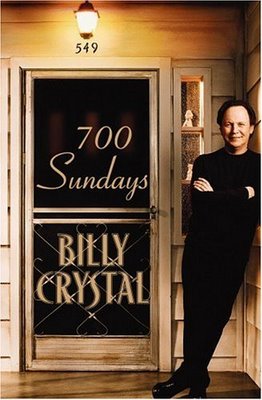700 Sundays
 Billy Crystal wrote the play 700 Sundays about his beloved father, Jack, who died suddenly of a heart attack when Billy was 15 years old. In the play Billy is the only actor.
Billy Crystal wrote the play 700 Sundays about his beloved father, Jack, who died suddenly of a heart attack when Billy was 15 years old. In the play Billy is the only actor.His dad worked two jobs six days a week, and the one full day he could spend with his wife and three sons was Sunday. Billy estimated that from the time he was born in 1948 until his father's death 15 years later, the two shared 700 Sundays.
Billy deeply and humorously recounts the experiences he had with his father, mother, and other key adults in his life-adults who shaped his goals, vision, and values.
Billy became very depressed when his father died. His two older brothers were off at college, and his mother went to work to support the family. Billy could not concentrate on school as he obsessed over his father's death. Given his love of sports he tried out for the school's basketball team but was distracted by the sadness that permeated his life. His play during tryouts was poor and he was certain he would not make the team. His coach asked him to come to his office.
Billy anticipated that the coach was going to inform him he did not make the team. Instead the coach gave voice to his pain by asking one simple question, "Billy, how are you doing?" The question served as an invitation for Billy to express the sadness he was experiencing, his difficulty concentrating, his wish that he could take away some of his mother's pain. The coach listened and then informed Billy that he had made the team. Billy tells the audience that it was one of the nicest things anyone could have done.
Billy and his dad were very close. On the evening of his death, they had an argument and Billy yelled at his father. His father asked that he not speak to him in that way again. Billy's parents then left to go bowling and Billy told the audience that he ran outside to tell his father he was sorry, but the car had already gone. Just an hour or so later, his father had a heart attack at the bowling alley and died.
Billy wondered if the argument had contributed to his dad's death. Such a question is not an easy burden to carry, but in writing and reliving his story Billy seems to have found the forgiveness needed to carry on. When past hurts get us stuck we can eventually became 'caged' to our thoughts and feelings of guilt and shame. Thankfully Billy found his way through.
How are you doing with the 'Sundays' that you have with your loved ones? Are there some past hurts that God is seeking to bring healing to? What kind of play would be written about you by your children after you're gone? Is that the title you want it to be?
If not, choose today to re-write the story line.
Jeremiah 31:9,12-13,17
"Tears of joy will stream down their faces, and I will lead them home with great care. They will walk beside quiet streams and not stumble. For I am Israel's father.
They will come home and sing songs of joy on the heights of Jerusalem. They will be radiant because of the many gifts the LORD has given them--the good crops of wheat, wine, and oil, and the healthy flocks and herds. Their life will be like a watered garden, and all their sorrows will be gone. The young women will dance for joy, and the men--old and young--will join in the celebration. I will turn their mourning into joy. I will comfort them and exchange their sorrow for rejoicing.
There is hope for your future," says the LORD.


0 Comments:
Post a Comment
<< Home